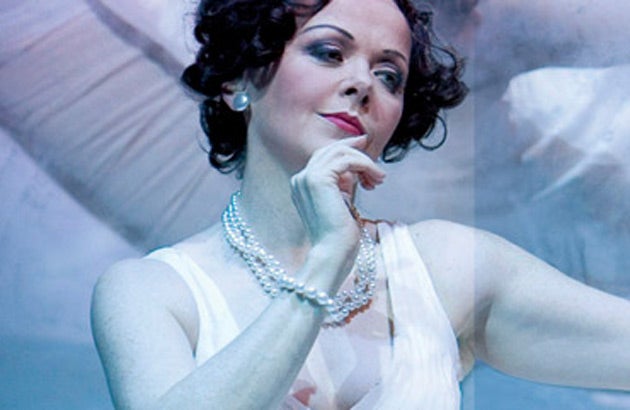Powder Her Face, Linbury Theatre, London / Thomas Ades, Barbican, London

When 24-year-old Thomas Ades unveiled ‘Powder Her Face’, this extraordinary chamber-opera became both a ‘succes d’estime’ and a ‘succes de scandale’ (for setting fellatio to music).
Fifteen years later, on successive nights, we had two very different opportunities to reconsider it: through the revival of Carlos Wagner’s production at the Linbury, and the premiere of Ades’s piano adaptation. How good is it?
Under Timothy Redmond’s baton, its brilliant pastiches of everything from Berg and Britten to tango and jazz still dazzle - and ‘pastiche’ undersells the sparkling originality of what Ades achieves with his accordion-enriched ensemble. The vocal writing still seems inventive, but the relentlessly repetitive screams and squeaks of the soprano - exacerbated by the fact that Ades is not bothered about comprehensibility - now seem trying. Moreover, this super-slick production emphasised the puerile perception underlying the whole thing. We were invited first to laugh at a very rich, very boring, and very horny woman, then to empathise with her tragedy: endless strip-teasing by everyone on stage reflected a desperate desire to have it both ways. Though the music dramatically changes colour for the closing scenes, the pathos only half worked because it was unearned: a more mature director would have laid the foundations for this volte face from the start. But what wonderful performances: from sepulchral-voiced Alan Ewing as duke, judge, and hotel manager; Iain Paton doubling as waiter, lounge lizard, and delivery boy; Rebecca Bottone was rivetingly comic in a medley of soubrette roles, and Joan Rodgers heroic as the doomed Duchess.
The ‘Concert Paraphrase on “Powder Her Face”’ which Ades presented on the Barbican Steinway was a splendidly Lisztean reworking, which pruning and shaping could turn into a virtuoso standard. There’s real electricity between Ades and his instrument, and though too fond of the sustaining pedal he gives everything he plays a fastidiously personal stamp. After allusive rarities by Janacek, Liszt, and Prokofiev, he delivered some Beethoven bagatelles with great freshness and charm. But he shouldn’t give up his day job.
Subscribe to Independent Premium to bookmark this article
Want to bookmark your favourite articles and stories to read or reference later? Start your Independent Premium subscription today.

Join our commenting forum
Join thought-provoking conversations, follow other Independent readers and see their replies